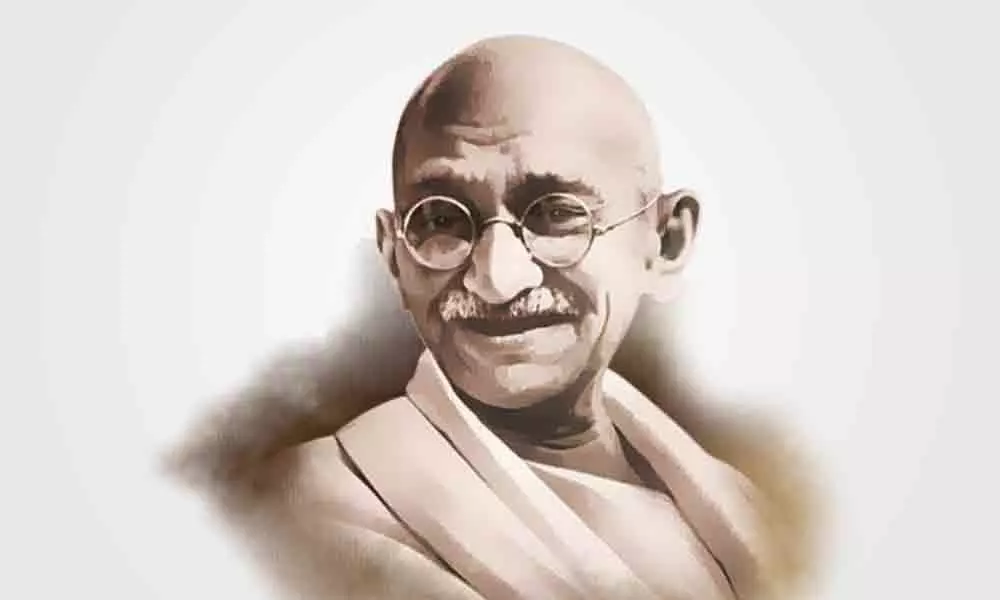Live
- Two Men Found Dead In Parked Caravan In Kerala
- Mandhana moves closer to top spot in ODI, T20I rankings
- IND vs AUS Boxing Day Test 2024: Sam Konstas Debuts, Travis Head’s Fitness in Question
- Congress Challenges Election Rule Amendments In Supreme Court
- Jaishankar’s US Visit: Key Diplomatic Engagement Amid Leadership Transition
- Orthodox Church Bishop Criticizes PM Modi’s Christmas Celebration Participation
- Janhvi style & grace takes centre stage
- Allu Arjun’s Pushpa 2 Becomes First Hindi-Dubbed Film to Cross Rs 700 Crore
- ‘Legally Veer’ pre-release event creates buzz
- ‘Chinni’ from ‘Daaku Maharaaj’ that strikes a chord with audience
Just In
It's high time we understood Mahatma deeper


The nation heard in silence various remarks of leaders of different hues on Mahatma's death anniversary which left a smirk on its face.
The nation heard in silence various remarks of leaders of different hues on Mahatma's death anniversary which left a smirk on its face. We are celebrating 150th year of Mahatma for the last two years - from 2018-20. It is laughable that each tried to own up the Father of the Nation in their own style to take a dig at others.
As Asghar Ali Engineer wrote on Mahatma's 125th anniversary, the latter's contribution to promotion of communal harmony is most significant in modern India. None can match his contribution with his work or claims. This contribution is neither merely academic nor only as political activist but much more than that he laid down his life for his cause.
Also, the Mahatma wrote and spoke profusely on this problem. We can hardly think of any individual in modern India who wrote and spoke on this problem as much as the Mahatma did. His writings and speeches on this problem run into hundreds of pages.
Mahatma wrote and spoke on this problem from all possible angles. It is possible to differ from him in many respects on this issue, but that is a different thing. But we can hardly doubt his sincerity. Even his opponents do not doubt it.
Also, he and Maulana Abdul Kalam Azad showed convincingly that being religious does not mean being communal. Both of them were profoundly religious and yet as much secular. Mahatma Gandhi and Maulana Abdul Kalam Azad rooted secularism in indigenous religio-cultural practices. For them, it was not an alien and western concept.
Mahatma Gandhi proudly described himself as being a Sanatani Hindu and yet he remained secular. It is possible if you are really a Sanatani. Hinduism, as is argued, is never a religion and shall never be. It has accepted all forms and formulations of all religions into it with respect and humbleness.
Whether one accepts it or not, it is a face. The Mahatma was always greatly disturbed whenever communal violence broke out. He did not simply show his annoyance by merely verbally condemning it. He rushed to the site of the massacre and threw himself into it and tried to pursue the culprits to stop ghastly killings.
He often undertook fast unto death to bring moral pressure on the killers. Be it Navakhali, be it great killings of Calcutta or killings in Delhi, the Mahatma rushed to the scene to save the situation and did save it.
One can argue that Gandhiji's great failure was his inability to stop partition of the country. But should one look into only this aspect and nothing else? After all the entire Congress leadership has to be blamed for the same.
Instead of getting into this futile exercise, shall we confine ourselves to more valuable contribution of the Mahatma to the nation and discuss the same for the betterment of the nation? Sadly, we do not do that and only keep looking at Gandhi from the prism of Godse to blame those in power now.
Can we forget Godse for a while and remember only Gandhi? Would not the world be better if Godses' are eradicated from our memory and Gandhis' are remembered by all?

© 2024 Hyderabad Media House Limited/The Hans India. All rights reserved. Powered by hocalwire.com






